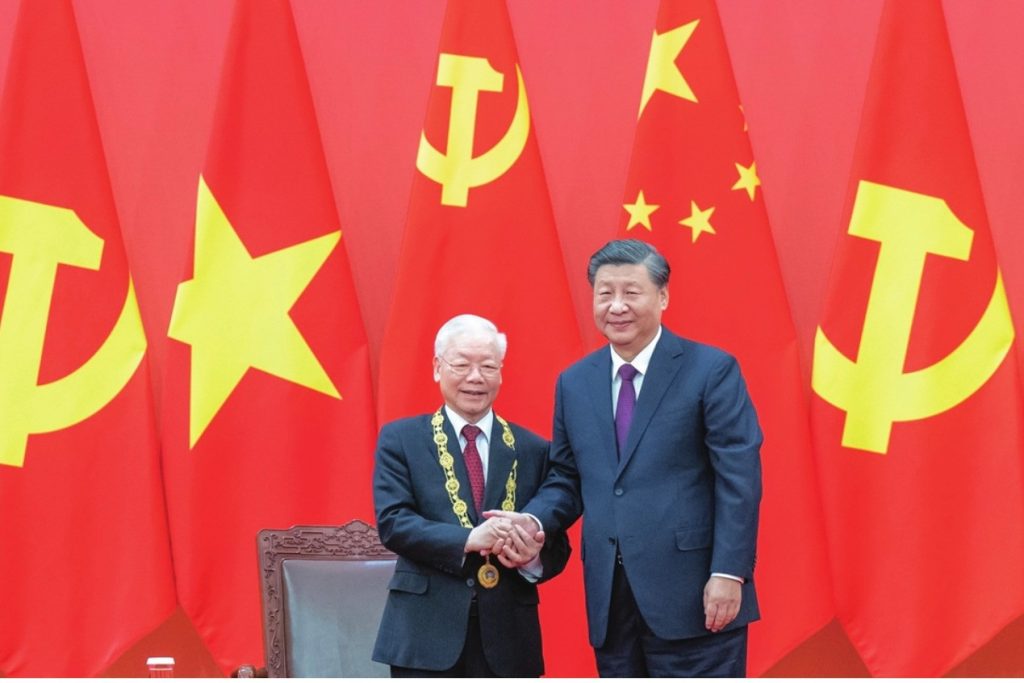
Will national interests be enough to turn a fierce enemy into a new friend?
Written By; Abdurrahman Adıgüzel – Sep 18 , 2023
Historical Background of the Relationship
Since China found its place on the stage of history, it has influenced the nations around it and increased its clout thanks to its culture, mentality and administrative structure of the state. Vietnam also, as China’s neighbor, had existed in China’s orbit for many years. Vietnam remained under Chinese suzerainty from the 3rd century BC to the 10th century AD. So Vietnam was ruled by the Chinese for more than a thousand years. During this time, Confucianism deeply influenced the lives of the Vietnamese. Moreover, everything in Vietnam was under the control of administrators appointed from China.
In the 10th century AD, Vietnam gained its independence and started bilateral diplomatic relations with China for the first time. However, it should be noted that despite Vietnam gaining independence, China’s superiority was very clear. Historically, China has always seen itself as a ‘Middle Kingdom’. In other words, the prevailing understanding was that China was at the center of everything, that it was superior to other states, and that those around it were nourished by China’s values, state order and system of thought. For this reason, Vietnam could not be fully independent neither culturally nor administratively. Vietnamese rulers tried to please the Chinese rulers and paid tribute for certain periods. Still, this process was valuable for the development of bilateral relations. The process mentioned above ended with the French occupation of Vietnam in 1858.
Vietnam remained a colony of France until the Second World War. Vietnam, which was occupied by Japan in the Second World War, was again subject to French domination after the war. With the Geneva Agreement signed in 1954, France withdrew from Vietnam and Vietnam was divided into two: North and South. One of the most critical points of Vietnam-China relations was the Vietnam war, in which the USA was involved. While the Western Bloc supported South Vietnam, the Communist Bloc supported North Vietnam. China provided more than 20 billion US dollars in aid to Vietnam throughout the war, sending its soldiers and providing intensive logistics and equipment support. Throughout the war, China always sided with Vietnam against the USA and France. Accordingly, former North Vietnamese President Ho Chi Minh expressed his gratitude to China as “Vietnam-China friendship is deep, comrade plus brother.”
It is possible to say that the Vietnam war was shaped around ideologies. However, as the Cold War progressed, pragmatism gained more importance in the foreign policies of Vietnam and China. National interest and security issues have taken precedence over ideologies. In 1974, China attacked the Paracel Islands, part of which Vietnam held, and took control of the entire islands. Especially since this date, Vietnam has begun to see China as a serious threat to itself. China had been at odds with the USSR since the 1970s, when it began to get closer to the US. The Khmer Rouge, also known as the Pol Pot administration, which seized power in Cambodia, adopted a very brutal attitude, killing thousands of civilians and dragging the country into disaster. When the Chinese-backed communist Pol Pot government started killing Vietnamese people living near the border, the USSR-backed Vietnamese army entered Cambodia and took over the country. The USA as well as China were not happy with this situation. In order to intimidate Vietnam, China attempted to organize an operation to force Vietnam to withdraw from Cambodia in 1979, but they had to retreat when they encountered a very tough defense.
Developing Economic Relations After the Cold War
Vietnam-China relations, which went through a bad period due to the events of the 1970s, were replaced by relatively good relations in which economic relations developed and trade increased with the end of the Cold War. The trade volume between the two countries has increased over the years. For example, it reached 3.6 billion US dollars in 2002, 4.9 billion in 2003, 20.7 billion in 2008, 27.3 billion in 2010 and 58 billion US dollars in 2014. China became Vietnam’s largest trading partner in 2004. The accession of China to the World Trade Organization in 2001 and Vietnam in 2007 accelerated the economies of both countries. Therefore, Vietnam does not want to lose a trade partner like China from which it benefits. However, Vietnam had a very serious trade deficit with China.
Vietnam, which does not want its economy to monopolize and fall under the control of China, has started to diversify the countries it trades with. Its inclusion in the Trans-Pacific Partnership in 2016 increased its trade with the USA and Japan. On the other hand, since Vietnam is a member of ASEAN, it benefits from ASEAN capital and has easier access to the markets of ASEAN countries. In 2018, there was a development in which Vietnam gained an economic advantage. Former US President Donald Trump began imposing high tariffs and trade restrictions on China in 2018, claiming that the US was being subjected to unfair trade practices. After this incident, many international companies withdrew from China. Some of these companies chose Vietnam in search of a cheap labor market. The increase in foreign investors made a direct positive contribution to the Vietnamese economy. However, it is a matter of debate how sustainable this investor attraction policy is. Because, although Vietnam has the potential for cheap labor, it is not at a level that can compete with China in terms of infrastructure, facilities and technological development.
Current Problems and Future Prediction
The closeness of the two countries at the level of ‘lips and teeth’ in the 1950s has completely disappeared today and has been replaced by the goal of a relationship that is as stable as possible. While the economic relations between Vietnam and China are progressing positively, the main problem of the two countries has been the security issue. After the 2000s, the two countries’ island problems and active discussions in the South China Sea continued. The biggest crisis between the two countries occurred in 2014. China’s giant oil rig HD 981 and the ships tasked with protecting it entered the borders declared by Vietnam as a special economic zone and searched for oil. While Vietnam reacted immediately to this incident, clashes occurred at sea. China’s aggressive attitude has caused nationwide protests against China in Vietnam, hence this crisis has further fueled hostility towards China in the country.
So why are the South China Sea and the islands so crucial for Vietnam? First of all, fishing is one of Vietnam’s important sources of income. Highly productive fish are found in areas that Vietnam claims as its own. Secondly, the Paracel Islands region has quite a lot of oil reserves, according to research and estimates by experts. Finally, maritime trade is vital for Vietnam, and much of it occurs via the South China Sea. For this reason, Vietnam does not want China to have a full say in this region, to restrict itself, and to threaten its national interests and national security. Inviting China to respect and comply with international law, Vietnam has sought new security cooperations. One of the biggest supports in this search came from the old enemy and new so called friend, the USA. The USA, which wants to surround China in the region, sees this as an opportunity. In this regard, the USA completely lifted the arms embargo against Vietnam in 2016. In 2018, a US Navy aircraft carrier, USS Carl Vinson, visited Vietnam for the first time since 1975, the end of the Vietnam war. Biden, who recently visited the capital Hanoi after the G20 summit, stated that after his meeting with Nguyen Phu Trong, Secretary General of the Communist Party of Vietnam, an agreement was reached to raise the level of relations between the two countries to the level of ‘comprehensive strategic partnership’.
Vietnam wants to expand its military cooperation not only with the USA. In this regard, it is increasing defense cooperation with Japan and India. For example, Vietnam and India conducted exercises in the Indian Ocean for two days. While ASEAN has a very positive profile in terms of cultural and economic cooperation, it remains somewhat weak in terms of defense cooperation. However, Vietnam wants to obtain maximum benefit in this area as well. In addition to its cooperation with other countries, Vietnam pays attention to strengthening its own Vietnamese People’s Army. For this reason, Vietnam increased its defense budget to 5.5 billion US dollars in 2021.
It is a fact that today Vietnam perceives China as a threat. However, in the process of foreign policy analysis, this situation should not lead to comments such as Vietnam wants to break its ties with China completely or Vietnam has made Western countries its allies. While Vietnam improves its relations with the USA, it avoids angering China. The important thing here is that Vietnam can use countries such as the USA, Japan and India as a counterbalance to China. Consequently, Vietnam has a successful foreign policy today. Vietnam’s experience of living with China and as its neighbor for two thousand years has taught Vietnam many things. Therefore, Vietnam wants its relations with China to progress on a stable basis and develop economically. On the other hand, China’s handling of the Taiwan and South China Sea issues will certainly be the determining factor in Vietnam’s future foreign policy towards China. Also, it will be important to observe the development of ASEAN in the future because the development of defense cooperation may open different doors for Vietnam. It is possible to say that Vietnam follows the non-aligned policy to a certain extent. Finally, India’s rise in the international arena may be an opportunity for Vietnam. As a matter of fact, Vietnam and India are increasing their cooperation in the Indo-Pacific region day by day.

Abdurrahman Adıgüzel graduated from Social Sciences University of Ankara, Department of International Relations. He continues his master's degree at Social Sciences University of Ankara, Department of Asian Studies. His main areas of study are Chinese Foreign Policy, China-Middle East Relations, South East Asia Region and Energy Security.
